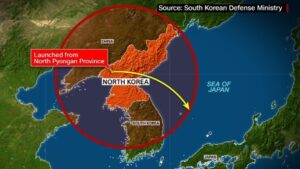by The Cowl Editor on February 17, 2017
News

by Daria Purdy ’19
News Staff
Tension increased this past week between North Korea and the United States and its allies as North Korea successfully tested a new nuclear missile.
The new missile is called the Pukguksong-2, and it was launched Sunday about 310 miles into the Sea of Japan. The distance is short of the estimated rage of the missile, which is around 1,864 to 3,417 miles.
The development of the Pukguksong-2 missile has caused the United States and its allies anxiety because the new technology of the missile makes it much harder to have a preemptive warning of a missile launch.
The new missile is a solid-fuel rocket, meaning it does not require the long process of fuel-loading in order to function properly. It can be stored on mobile launchers, rolled out, and prepared for launch within minutes, if the North Korean reports are to be believed.
This would make it much harder to receive warning of a missile launch through satellite technology. North Korea’s leader, Kim Jong-Un, claimed, “Now our rocket industry has radically turned into a high-thrust solid-fuel-powered engine from liquid-fuel rocket engine and rapidly developed into a development and creation-oriented industry, not just copying samples.”
Defense officials in the area say that North Korean missiles do not yet have the ability that Kim Jong-Un claims, but that the launch of the Pukguksong-2 represents significant advances in the stealth and range of these missiles.
The test took place while a state dinner was being held between President Donald Trump and Prime Minister of Japan Shinzo Abe. Aides interrupted the dinner at the Mar-a-Lago resort in Florida to bring both leaders reports of the missile test.
Abe called the missile test “absolutely intolerable.” Japan’s Chief Cabinet Secretary Yoshihide Suga, meanwhile, echoed Abe’s words, stating that the test was a “clear provocation to Japan and the region.”
A United Nations Security Council meeting was requested by the United States, Japan, and South Korea in response to the missile launch.
The United States Security Council responded that it plans to hold consultations on an “urgent basis.” Tokyo has lodged protests against North Korea through its embassy in Beijing.
Despite being allies of North Korea, both China and Russia also spoke out against the missile launch. China denies the need to take any greater responsibility in curbing the actions of North Korea, but the Foreign Ministry said that China is opposed to launch activities that are in violation of UN resolutions.
China is North Korea’s most important ally, and helps to keep it afloat economically amidst crippling sanctions. Yet, the recent rhetoric concerning the launch of the Pukguksong-2 reflects a trend in which China has begun to take a tougher stand on the North Korean nuclear program.
The Foreign Ministry of Russia, another important North Korean ally, said that the missile launch was in “defiant disregard” of UN resolutions.
This missile test is the first since Trump’s inauguration, and it can be seen as the first foreign challenge to the Trump administration.
So far, the response of President Trump has been to issue a joint statement with Abe, in which he said that he had “100 percent support” for Japan, and called them “a great ally.”